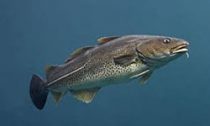
The seas around Britain may be getting so noisy that fish species like cod and haddock now have some difficulty communicating with each other. And if their chatter is being obscured, it could hamper their ability to breed. Steve Simpson and colleagues are testing the idea by dragging hydrophones through coastal waters to record the marine soundscape.
It has long been recognised that large marine mammals are susceptible to noise pollution – as are coral reef fish.
But the new study intends to understand the impacts on some more familiar UK fish species.
“Cod particularly have very elaborate calls compared with many fish,” the University of Exeter professor told BBC News.
“They vibrate their swim bladder – their balloon inside them – to make sound.
“They can create a whole range of different pops, grunts and rumblings.”
The animals vocalise at the point of spawning: the male sings and the female then assesses whether the male is any good before she releases her eggs. Cod also use sound to navigate, establish territories and warn their group of an immediate threat. These are all activities that could be compromised if the din from shipping, oil and gas exploration and other human-produced noise sources become intolerable. To date, very little work has been done to map the UK marine soundscape, says Prof Simpson. His team aims to change that by deploying kayak-drawn underwater microphones, or hydrophones, in a number of localities right around the British Isles.
One aspect to be investigated is whether regional fish populations all vocalise slightly differently – the possibility that the sounds they make may be structured differently. Such dialects have previously been noted in a whole range of animals from songbirds to killer whales, and has also been documented in clownfish. Prof Simpson says the same appears to be true of cod also, based on some American research. The observation would be particularly relevant in the context of climate change, which has seen the waters around Britain warm and some fish start to move their ranges further north. A concern might be that incoming and resident populations are slow to recognise each other’s vocal repertoire, which again could inhibit integration and breeding.
“It’s common in animal systems for a local population to develop a local approach, particularly around reproduction,” the prof explained.
“Cod tend to hang around near the bottom at spawning time, and then a female and a single male will rise towards the surface and he’s got about 10 seconds to get his love song right. If he does, she’ll release her eggs; get it wrong and she’ll swim back down to the bottom.”
Limiting noise pollution was very doable, the Exeter scientist said, and he cited the example of the UK’s forthcoming polar research vessel, RRS Sir David Attenborough, which would have a silent hull. Prof Simpson’s work is being presented at Into the Blue, a nine-day event in Liverpool starting on Tuesday that will feature science funded by the Natural Environment Research Council (NERC).













Social Profiles